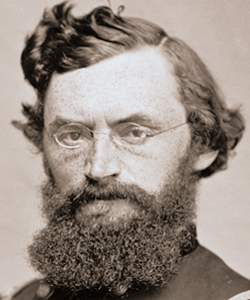Carl Schurz (American National Biography)
Scholarship
[Carl Schurz's] principal occupation, however, was politics, and since he was an opponent of slavery, he joined the Republican party. He had become fluent in English, was an excellent speaker, and was much sought after by the party to win over other German Americans. So effectively did he campaign for the antislavery cause in two languages that in 1857, before he had even completed his naturalization, he was nominated for lieutenant governor. Because of nativist influence, he, unlike other Republicans, lost. But he remained loyal to the party, even in 1859 when he failed in his efforts to obtain the gubernatorial nomination. Lecturing throughout the North and taking up the law to recoup financial losses incurred during the panic of 1857, he made a name for himself and in 1860 became the chairman of the Wisconsin delegation to the Republican National Convention in Chicago.
In Chicago, Schurz first favored William H. Seward but then switched to Abraham Lincoln, whom he had come to appreciate in the 1858 campaign. Elected to the Republican National Committee, he organized a campaign centered on ethnic groups. He himself wooed the Germans, and Lincoln was convinced that this effort made a decisive contribution to the Republican victory. Schurz's reward was an appointment as minister to Spain.
In Chicago, Schurz first favored William H. Seward but then switched to Abraham Lincoln, whom he had come to appreciate in the 1858 campaign. Elected to the Republican National Committee, he organized a campaign centered on ethnic groups. He himself wooed the Germans, and Lincoln was convinced that this effort made a decisive contribution to the Republican victory. Schurz's reward was an appointment as minister to Spain.
Hans L. Trefousse, "Schurz, Carl," American National Biography Online, February 2000, http://www.anb.org/articles/04/04-00886.html.



